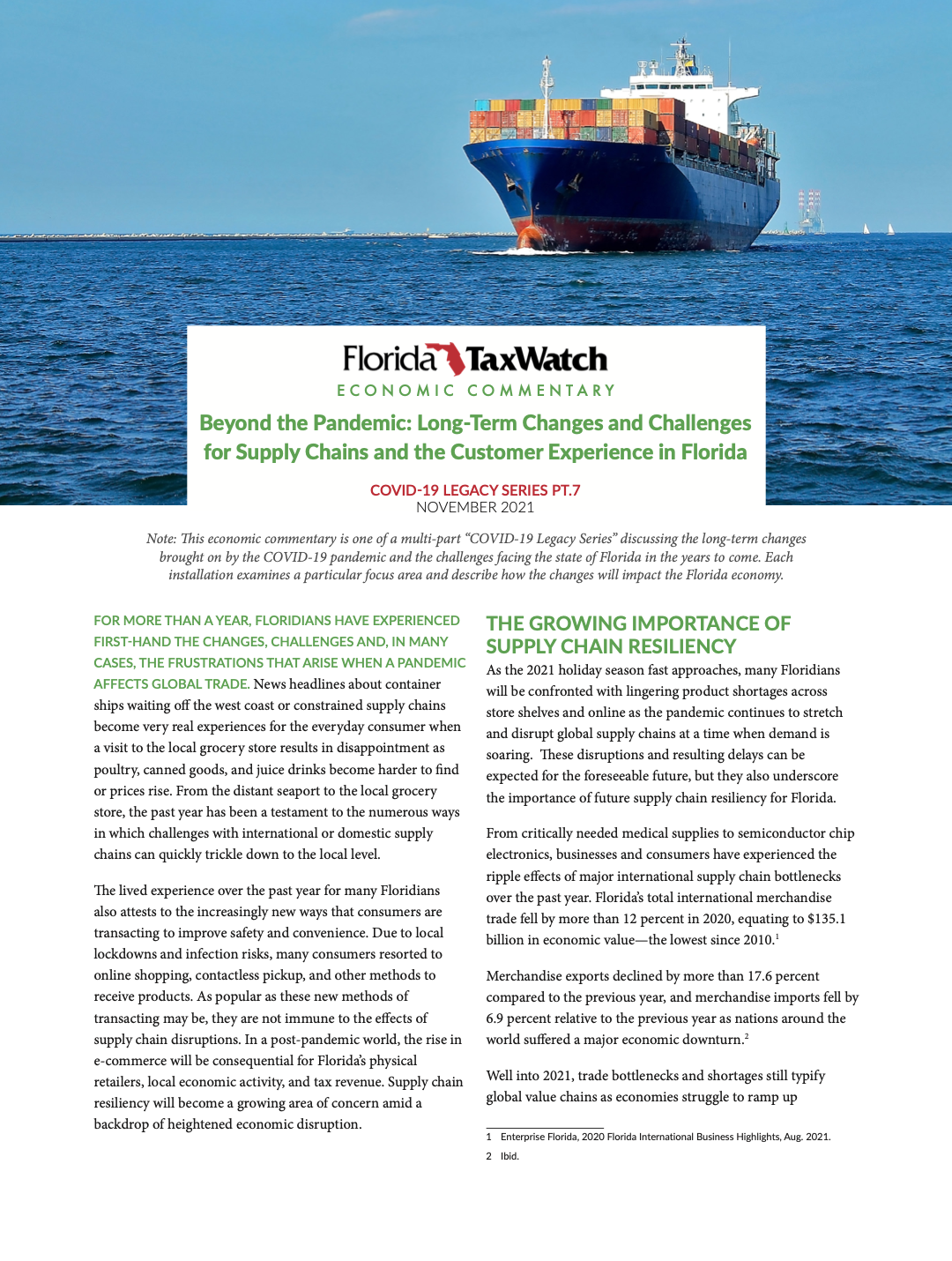Beyond the Pandemic: Long-Term Changes and Challenges for Supply Chains and the Customer Experience in Florida

FOR MORE THAN A YEAR, FLORIDIANS HAVE EXPERIENCED FIRST-HAND THE CHANGES, CHALLENGES AND, IN MANY CASES, THE FRUSTRATIONS THAT ARISE WHEN A PANDEMIC AFFECTS GLOBAL TRADE. News headlines about container ships waiting off the west coast or constrained supply chains become very real experiences for the everyday consumer when a visit to the local grocery store results in disappointment as poultry, canned goods, and juice drinks become harder to find or prices rise. From the distant seaport to the local grocery store, the past year has been a testament to the numerous ways in which challenges with international or domestic supply chains can quickly trickle down to the local level.
As the 2021 holiday season fast approaches, many Floridians will be confronted with lingering product shortages across store shelves and online as the pandemic continues to stretch and disrupt global supply chains at a time when demand is soaring. These disruptions and resulting delays can be expected for the foreseeable future, but they also underscore the importance of future supply chain resiliency for Florida.
Well into 2021, trade bottlenecks and shortages still typify global value chains as economies struggle to ramp up production. The pandemic has highlighted the inherent trade-off of globally interconnected supply chains. At their best, international supply chains can lower business costs; however, vulnerability to largescale disruptions can quickly destabilize product movement, increasing company costs and harming the customer experience.
In regards to retail sales, a combination of social distancing requirements, lockdowns, fewer tourists, and consumer preferences made the pandemic-induced recession particularly difficult for Florida’s retailers. In April 2020, monthly retail sales fell 21.9 percent over the year compared to 2019 (See Figure 1). Even though retail sales returned to positive year-over-year percentages by the summer of 2020, sales remained depressed throughout the remainder of the year and never eclipsed 10 percent until early 2021.
E-commerce sales, as a percentage of total retail sales, reached 15.7 percent during the second quarter of 2020 and have since leveled out at around 14 percent throughout 2021 (See Figure 2). For comparison, in 2017, e-commerce only comprised 8 percent of total retail sales after adjusting for seasonality. Certain product categories will be some of the biggest beneficiaries of the expansion in online shopping. Apparel and accessories, food and beverage, and health and personal care products have witnessed, and are forecast to experience, some of the fastest growth in e-commerce as the ongoing recovery continues to release pent-up demand.
Shifting consumer behaviors and changes to retail trade will have a discernible impact on tax revenue for state and local governments. During the 2020-2021 legislative session, the Florida Legislature passed, and the Governor subsequently signed, a new law that would require most marketplace vendors located outside of the state to collect and remit sales tax when selling products and services to residents in Florida. As discussed in a previous Florida TaxWatch research, the remote sales tax will promote fairness by leveling out the playing field for Florida businesses that compete with out-of-state sellers.
From the supply chain to the point of sale, the customer experience in Florida will be constantly changing. When domestic supply chains wrestle with labor shortages, a lack of supplies, or transportation issues, some food items may be hard to find on some store shelves. Or when international supply chains deal with closed ports or production that has not ramped up yet, certain products may be backlogged. These enduring challenges for value chains intersect with shifting consumer expectations for safety and convenience, which increases the use of online shopping. Although some of these changes and challenges are beyond Florida’s control, it is imperative to prepare for future disruption by strengthening in-state production and manufacturing capacity to satisfy customer demands in a timely, efficient manner.